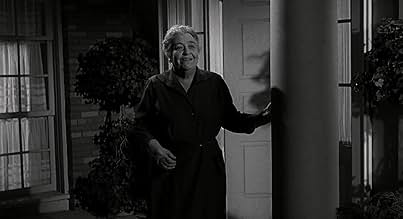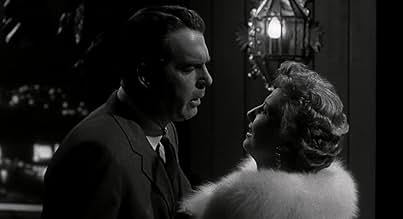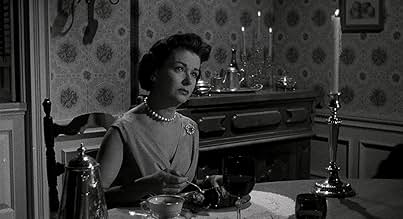Ein Spielzeughersteller, der sich von seiner Frau und seinen Kindern ignoriert und nicht gewürdigt fühlt, beginnt, eine frühere Liebe wieder aufleben zu lassen, als eine ehemalige Mitarbeite... Alles lesenEin Spielzeughersteller, der sich von seiner Frau und seinen Kindern ignoriert und nicht gewürdigt fühlt, beginnt, eine frühere Liebe wieder aufleben zu lassen, als eine ehemalige Mitarbeiterin in sein Leben zurückkehrt.Ein Spielzeughersteller, der sich von seiner Frau und seinen Kindern ignoriert und nicht gewürdigt fühlt, beginnt, eine frühere Liebe wieder aufleben zu lassen, als eine ehemalige Mitarbeiterin in sein Leben zurückkehrt.
- Regie
- Drehbuch
- Hauptbesetzung
Empfohlene Bewertungen
MacMurray is a successful toy developer, Clifford Groves, married to Marion (Bennett), and they have three children (Reynolds, Perreau, and Nugent). Marion is preoccupied with the kids and the household, while MacMurray is longing for some alone time with her and to do something different - take a weekend off, go to the theater -- but something always happens that prevents it.
When Marion can't make a theater performance because of their daughter's dance recital, Cliff stays home alone. A woman who once worked for him, Norma Vale (Stanwyck) comes over to say hello. She's now a successful dress designer in from New York. He takes her to the theater instead, and then she asks to see his office.
When a planned weekend in the desert with Marion doesn't work out because one of the girls breaks her ankle, Marion insists that Clifford go without her and relax. There, he runs into Norma again. Unfortunately, his son (Reynolds) shows up and thinks Cliff and Norma are involved. He and his friends leave without making their presence known to his dad. Without realizing what's happening, Cliff is falling for Norma; and he doesn't know that she's always been in love with him.
This is a midlife crisis, '50s style, with the underpinning of the grass is always greener. That wasn't the original intention, of course - the original intention of the film is that Norma is lonely and would give up her wonderful career to have a family like Marion and Cliff have. People still feel this way, but today, it's more because of the road not taken, not so much because of dissatisfaction. Nothing's perfect, as the film shows us. Cliff sees Norma's freedom, the attention she pays him, her interest in his work. He feels in fourth place behind the kids to Marion. He's sick of being like the robot that is his latest toy. You wind him up, he works, he comes home, he has dinner, he goes to bed. With Norma he sees an opportunity for something different. Youth. To be put first. Endless possibility.
What a lovely movie, and I thought I was sitting down to some second feature. Instead, it has Sirk's magic touch and his sly criticism of the picture-perfect '50s American life. Frankly, I could have slapped the kids and Marion for not seeing what's in front of their faces, but to be fair, kids are self-involved, and Marion is completely committed to doing what she thinks is important for Cliff and their family.
Wonderful acting, with MacMurray as the frustrated Everyman, Bennett as an attractive, disciplined woman, and Stanwyck has someone who has earned wisdom the hard way, through hard work and disappointment.
Highly recommended.
Wusstest du schon
- WissenswertesAcclaimed documentary filmmaker Errol Morris named it as one of his 10 favorite films in the 2002 BFI Sight & Sound Poll.
- PatzerNear the end, Vinnie is telling his girlfriend that he was wrong "about Norma and Cliff" in these exact words. But Cliff is his father; he wouldn't refer to his father by his first name.
- Zitate
Norma Miller Vale: Love is a very reckless thing. Maybe it isn't even a good thing. When you're young and in love, nothing matters except your own satisfaction. The tragic thing about growing older is that you can't be quite as reckless anymore.
- SoundtracksBlue Moon
(uncredited)
Written by Richard Rodgers and Lorenz Hart
Played on one of the toys and heard as a theme throughout the film
Top-Auswahl
- How long is There's Always Tomorrow?Powered by Alexa
Details
- Erscheinungsdatum
- Herkunftsland
- Sprache
- Auch bekannt als
- Pasión otoñal
- Drehorte
- Apple Valley Inn - Apple Valley Inn Road, Apple Valley, Kalifornien, USA("Palm Valley Inn")
- Produktionsfirma
- Weitere beteiligte Unternehmen bei IMDbPro anzeigen
- Laufzeit
- 1 Std. 24 Min.(84 min)
- Farbe
- Seitenverhältnis
- 1.85 : 1



































